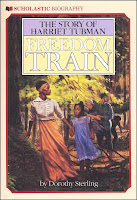217. Freedom Train: The Story of Harriet Tubman by Dorothy Sterling
I picked this book because I've read the name 'Harriet Tubman' in books and in poems where it represented the image of a bold and strong woman. However, for some reason, I've never taken the pain to explore further. Hence, when I saw a copy of Freedom Train: The Story of Harriet Tubman (Scholastic, 1954; 191) by Dorothy Sterling I never, for a microsecond, dithered in my decision to purchase it. This was the reason why I never discovered that the writing had been tailored toward younger readers; in Ghana possibly Junior High students.
However, regardless of the unchallenging prose, a lot lies within the covers of the book. It tells the almost mythical story of Harriet Tubman with her slave-parents on a farm and how badly she was treated. One of such mistreatment crushed her skull and caused her to lapse into frequent sleeps. But even as a child, Harriet yearned for freedom and to do things her way. This story brings out the power of the will. Even when her brothers staggered and returned when the path to freedom in the North wasn't clear, Harriet never waned in her decision to become free. She achieved this and more. Using songs as codes she helped smuggled her octogenarian parents and her siblings out from slavery and several other people. Freeing people became her life's work, which was later made dangerous because even the north (of America) became unsafe for runaway slaves. She became popularly known as Moses with mythical descriptions and attributions.
Harriet's life is a lesson to all, especially those who today are eager to forget how far we've come. In the right perspective, it gives some form of background to several stories like To Kill a Mockingbird and most of Toni Morrison's novels: Beloved and Song of Solomon included. The author did well to capture the African life of songs and storytelling. Even where she might have taken some liberty to reconstruct, she did it in a way that didn't take anything away from this great woman. Harriet's story cements the major role several African American women, those who were not far removed from the first slaves, played in empowering the African American people.
A further search on Harriet's revealed that she was told she was an Ashanti, making her a slave from the Gold Coast and there was a character, in book, with a Ghanaian-sounding name - Cudjoe. (Similarly, Sojourner Truth was born to a Gold Coast (Ghanaian) father and a Guinean mother who had both been sold into slavery.) This book is revealing; it shows how wicked a person could be if only he or she could gather justifications. The justification for slavery and the wickedness most whites showed to blacks is that the white colour is superior to the black colour; something which still occurs in both subtle and open ways today. Consequently, blacks became part of the master's property; part of their livestock and furniture and could be sold and bought at auctions. They decide either to make you marry or not and if a slave is not healthy he or she is prevented from perpetuating his or her kind.
After Harriet's accident she experienced a decline in her physical strength, which prior to that was enormous, and consequently, her work rate drastically reduced. This made her a candidate for trade but these qualities, relapsing into frequent sleep, put people off. She married John, a man who was helplessly enslaved and who loved it too. But she never allowed John to tie her down. In fact, it was after the marriage that Harriet escaped into freedom; John remained in slavery.
This small book, capable of being read in a day, is an introductory text to such an important figure in Black American history. It is recommended for all who truly wants to know how torture and history of African (Black) Americans.




In the US when we think of slavery and freedom, the name Harriet Tubman comes to mind. She was a hero, a beacon of strength and an example to all. She had a goal and she saw it through, bringing others to freedom with her. No PHD (pull him down) mentality for her. Thank you for reviewing this book. I hope more people get to learn about the greatness of the woman and importance of the underground railroad
ReplyDeleteI hope that Black American history and African history will merge so we can know much about such heroes.
DeleteHarriet Tubman truly has taken on a mythology about her, such that probably many of us in the US don't take enough time to learn about her life in greater depth and detail. This is a lovely and informative summary - sounds like a perfect book for young and old alike.
ReplyDeleteIt's an interesting book. A summary of a life
DeleteAn excellent book! I read it in 5th grade (age 10) and still remember it vividly decades later. I've wondered whether it was still in print...
ReplyDeleteMine is a used-book. Yes, that's great.
DeleteThanks PL
ReplyDelete